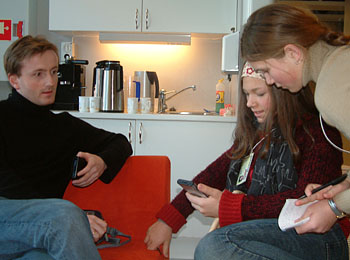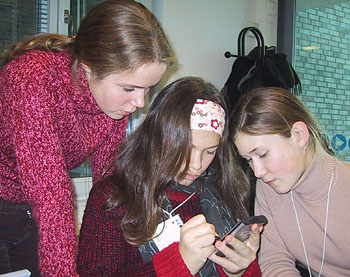
|
As first! school in the world, a new project in a great scale is initiated in Norway with use of pocket PCs at Amot lower secondary school in which all students and all teachers in the two classes at grade 9 (students are 14 years old) will be given pocket PCs with built-in WiFi (wireless LAN) and Bluetooth.
After a thorough investigation, the new HP IPAQ H5455 Pocket PC has been chosen as the preferred pocket PC. In competition with other schools in Norway, Amot secondary school has been chosen as project school by ITU (Network for IT-Research and Competence in Education).The use of pocket PCs will be a challenge for the school, and the involved teachers and students will focus on how pocket PCs can engage and motivate in the learning process. In the project the pedagogy will be in focus.
Pedagogy in focus Internet has given schools all over the world new pedagogical possibilities the last years, and high speed Internet access is mandatory for the project. The school has high speed Internet access through the Norwegian university network (Uninett). By using Internet actively the project will empathize: ∑ Students will publish their own works with multimedia content on the net and also content created for handheld computers ∑ Use of Internet as an information channel ∑ The plans for the classes in various subjects will be published on the net ∑ Let the students have access to digital learning resources ∑ Communication (mail, but also instant messaging and possibly video conferences) ∑ Synchronize students own work done with pocket PCs against the students digital portfolios on the schools servers (Microsoft and Linux) ∑ And - we think handhelds have potential to be used in new and original ways. We donít yet know the potential The project will also examine use of: ∑ Mobile library (e-books) ∑ Inputting data, for instance during science experiments, regardless of where the work is taking place, indoors or outdoors. The school has the last 3 years, through the editorial responsibility for the nationally based internet paper the Youth Paper (Norwegian link), covered events in connection with the yearly Nobel Peace Prize Ceremony and events around this important media happening (yes, it is). Students and teachers are living in Oslo for 5 days and through these days they publish articles with multimedia content as soon as they can. Because of this work, we have a great archive (example) in form of text, pictures, sound and video from these events. This material can be used for learning in many contexts, for example by developing digital learning resources also meant for handheld computers. In a way we can say Ė we want that the learning can hit the small screens.
Cooperation and reflection over own work and practise The project will be a part of the ordinary pedagogical school day at the school and will be integrated into PILOT (Innovation in Learning, Organization and Pedagogy). PILOT is a nationally project funded by the Ministry of Education and Research in Norway hoping to bring more innovation in schools organization, pedagogy and learning. As part of the PILOT project, all teachers at the school are participating in a process where focus is learning and digital portfolios in a new digital world. Both teachers and students must reflect over own practise and own work. We hope that the project with pocket PCs will contribute to develop: ∑ Students reflection about own learning, learning strategies and learning processes ∑ For the teachers Ė reflection about own practise and guidance of students in a digital world ∑ Argumentation as an important factor in learning with pockets PCs. We want active students and we will take them seriously. In the project they will be active partners, both orally and written, in how use of handheld PCs can contribute to better learning or not Mobil learning Handheld PCs can to a greater extent than we have had possibilities up till now, melt together learning in school and learning outside of school. Students will get a tool which they can use to learning both at school and outside school. Thatís what Bridget Somekh at the ITU conference in October 2002 in Oslo called Learning unlocked from school (Powerpoint). Students and teachers will operate at various learning areas. Learning does not only take place at school, but almost in all contexts.
Pocket PC and other types of handhelds can because of their size have better possibilities than other computers (desktops and notebooks)
But it is also important to say that itís no contradiction between use of handhelds and desktops/notebooks. We think handhelds and desktops/notebooks can supplement each other. Video editing is for the time being not suitable with handheld computers Ė on the other hand Ė the finished product can be seen on handhelds which get stronger and stronger multimedia possibilities. Both teachers and students are really seeing forward to this project. In mid January the pocket PCs will arrive at school and a workshop will take place involving all students, teachers, parents and ITU. A web site for the project is under development. You can read more about the school and their projects in the schoolís contribution to eSchola 2002.
|
|

